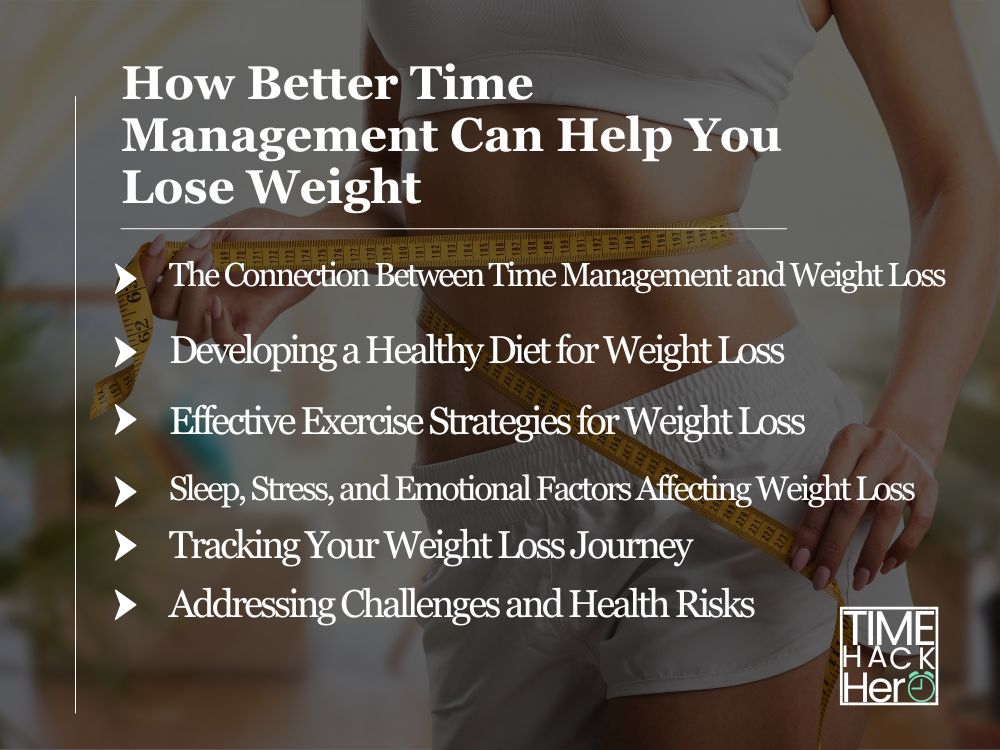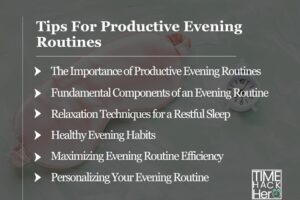Time management has a significant impact on various aspects of our lives, including our ability to lose weight. Many people struggle with finding time to dedicate to their weight loss goals, especially with busy schedules that involve work, family, and other activities. By managing time more effectively, individuals can create opportunities to build healthy habits, engage in regular exercise, and maintain a balanced diet, all of which are crucial components to weight loss.
Improving time management skills can not only help individuals achieve a calorie deficit – a fundamental requirement for weight loss – but also provide the foundation for a sustainable, long-term plan. Proper time management allows for better prioritization of activities such as meal planning and preparation, daily workouts, and adequate sleep. These factors, when consistently incorporated into daily routines, contribute to the gradual loss of weight and overall improvement in general well-being.
Incorporating time-management techniques, such as scheduling workouts and designating time for meal planning, can make significant differences in an individual’s weight loss journey. The extra attention devoted to organizing, planning, and investing time wisely can lead to more efficient weight loss efforts and, ultimately, the achievement of desired goals.
Table of Contents
The Connection Between Time Management and Weight Loss
Importance of Planning and Routine
Proper time management plays a crucial role in successfully losing weight. By planning your daily and weekly schedule, you can prioritize dedicated time slots for habits and actions that contribute to achieving desired weight-loss goals. This approach can help enhance your commitment and motivation towards a healthier lifestyle.
Creating a routine helps maintain consistency in incorporating beneficial habits such as physical activity and meal prepping. Consistency in physical activity leads to improved health benefits, such as strengthened cardiovascular system and increased calorie burn. Establishing a meal prep routine ensures consumption of nutritious meals, further supporting weight loss efforts.
Routine tips for weight loss:
- Schedule specific times for physical activity.
- Prioritize meal planning and grocery shopping.
- Implement gradual, realistic changes in daily habits.
Incorporating Lifestyle Changes
Time management is imperative when it comes to adapting to lifestyle changes for healthy weight loss. Addressing various aspects of life, from sleep to stress management, can have a significant impact on weight loss results.
Sleep is a vital component of good health, and inadequate sleep has been associated with weight gain and obesity. Manage your time effectively to ensure consistent quality sleep. Adequate rest has the potential to boost metabolism and support overall wellness.
Physical activity is essential for calorie burn and overall health benefits. Allocating time for daily exercise sessions can help create long-lasting healthy habits. Find an activity that suits your preferences and schedule, whether it’s walking during lunch breaks or attending fitness classes.
Stress management plays an essential role in weight loss efforts. Chronic stress can lead to emotional eating, affecting your commitment to a weight-loss focused lifestyle. Time management can help you allocate adequate periods for stress-relieving activities such as meditation, yoga, or socializing with friends and family.
In conclusion, time management is crucial in fostering positive changes in your habits, physical activity, and overall lifestyle, ultimately contributing to successful weight loss. Prioritize planning and routine to help establish a healthy lifestyle and improve your overall well-being.
Developing a Healthy Diet for Weight Loss
Maintaining a healthy diet for weight loss can be achieved through better organization and time management. This section provides guidance in meal planning and preparation, choosing nutritious foods, and managing portion sizes.
Meal Planning and Preparation
One key to weight loss success is developing a meal plan that incorporates nutritious and filling foods. Planning your meals in advance can help you avoid impulsive eating decisions, especially when you’re short on time. Once you have planned your meals for the week:
- Schedule time for grocery shopping and meal prepping.
- Make a shopping list with ingredients needed for your recipes.
- Pre-cut and pre-cook fruits, vegetables, and proteins to save time during the week.
- Cook and store meals in portion-controlled containers for easy grab-and-go options.
Choosing Nutritious Foods
Selecting nutritious foods is essential for maintaining a healthy weight. Aim for a well-rounded diet that includes whole grains, vegetables, lean proteins, and healthy fats.
When making food choices, consider the following:
- Choose colorful fruits and vegetables for a variety of nutrients.
- Opt for whole grains such as brown rice, quinoa, and whole wheat bread.
- Select lean proteins like chicken, turkey, fish like tuna, and plant-based options (beans, lentils, tofu).
- Incorporate healthy fat sources like avocado, nuts, and olive oil.
Managing Portion Sizes
Controlling calorie intake is crucial when trying to lose weight, and monitoring portion sizes can help prevent overeating. Use the following guidelines to estimate portion sizes:
| Food Group | Serving Size |
|---|---|
| Grains | 1/2 cup cooked rice, pasta, or quinoa; 1 slice of whole wheat bread |
| Fruits | 1 medium fruit; 1/2 cup chopped fruit; 1/4 cup dried fruit |
| Vegetables | 1 cup raw leafy vegetables; 1/2 cup cooked or chopped raw vegetables |
| Protein | 3 ounces cooked meat, poultry, or fish; 1/4 cup cooked beans |
| Fats | 1 teaspoon oil; 1/8 of an avocado; 1 tablespoon nuts or seeds |
Remember, consistency is crucial when developing a healthier diet for weight loss. Stick to your meal plan and incorporate nutritious, portion-controlled meals to help you achieve your goals.
Effective Exercise Strategies for Weight Loss
Choosing the Right Form of Exercise
There are numerous forms of exercise that can help you lose weight, but selecting one that aligns with your preferences and lifestyle is important. Some popular and effective exercises for weight loss include:
- Walking: A low-impact and accessible activity that can be done anytime, anywhere.
- Jogging: A step up from walking, jogging provides an increased calorie burn and cardiovascular benefits.
- Running: An even more intense exercise, running improves overall fitness and significantly boosts calorie expenditure.
- Cycling: An excellent low-impact exercise that strengthens leg muscles while also increasing cardiovascular endurance.
- Swimming: A full-body workout that’s especially ideal for those with joint issues, as the water’s buoyancy reduces stress on the body.
- Weight training: Strength training helps to build muscle, which in turn increases your metabolism, leading to a higher calorie burn even at rest.
- Yoga: A low-impact option that combines stretching, strength-building, and balance, yoga can support weight loss by improving mindfulness and reducing stress.
Incorporating Regular Physical Activity
Creating a consistent exercise routine is crucial for long-term weight loss success. Here are some tips to make physical activity a regular part of your life:
- Schedule it: Set aside specific days and times for your workouts and treat them as non-negotiable appointments. This will help ensure that exercise becomes a priority instead of an afterthought.
- Start small: Begin with short, manageable workouts and gradually increase their duration and intensity over time. This gradual approach is more sustainable and reduces the risk of injury.
- Find a workout buddy: Having a partner who shares your weight loss goals can provide motivation, encouragement, and accountability, making it more likely that you’ll stick to your exercise routines.
- Make it enjoyable: Choose activities that you genuinely enjoy, whether it’s dancing, hiking, or engaging in team sports. An exercise routine that feels like fun is more likely to become a habit.
- Mix it up: Incorporating a variety of exercises into your routine can help prevent boredom and keep you motivated while also working different muscle groups.
- Track your progress: Record your workouts, and celebrate milestones and achievements to maintain momentum and motivation for continued weight loss success.
Sleep, Stress, and Emotional Factors Affecting Weight Loss
Sleep Quality and Quantity
Getting adequate and quality sleep is essential for weight loss. Poor sleep is associated with increased oxidative stress, glucose intolerance, and insulin resistance1. Insufficient sleep may lead to weight gain by increasing late-night snacking and cravings1. To improve sleep quality, consider maintaining consistent bedtime habits, such as going to bed and waking up at the same time each day.
Stress Management
Stress plays a significant role in weight management, as it can lead to an increase in cortisol, which is a hormone that can contribute to weight gain, especially around the waist circumference2. High stress levels can also elevate blood pressure and affect your overall health. To manage stress, incorporate self-care activities into your lifestyle, such as meditation, exercise, or spending time with loved ones.
Emotional Eating and Food Cravings
Emotions can greatly affect our eating habits and potentially lead to setbacks in weight loss efforts. Emotional eating often results in cravings for high-calorie, high-fat foods. To overcome this issue, it’s essential to develop awareness of your emotional triggers and find alternative ways to cope with these emotions. Some techniques include:
- Keeping a food journal to track your eating patterns and emotions
- Practicing mindfulness and deep-breathing exercises
- Seeking support from friends, family, or a professional therapist
By addressing the underlying emotional factors that influence eating behaviors and practicing better time management, you can create a more balanced lifestyle to support your weight loss journey.
Tracking Your Weight Loss Journey
Setting Realistic Goals
Start your weight loss journey by setting realistic and achievable goals. Consult your health care provider to determine a healthy weight range for your height and age. Focus on making gradual changes to your lifestyle, such as incorporating healthier food options and increasing physical activity. Consider smaller goals like losing 1-2 pounds per week or reducing portion sizes, as these can lead to long-term success in weight management.
Monitoring Progress
It’s crucial to track your progress throughout your weight loss journey. Use apps, a food journal, or a simple notebook to record your daily food intake and exercise routine. Weigh yourself regularly, but not obsessively, as fluctuations in weight are normal. Try tracking other metrics, such as inches lost, how your clothes fit or improvements in your overall stamina and strength. Tracking your progress helps you stay motivated and focused on your goals.
Utilizing Support and Accountability
Seek support and accountability from friends, family, or even online communities who share your weight loss goals. Research indicates that having a strong support network can improve your chances of long-term success in weight management. Support can include emotional encouragement, practical assistance (like offering to watch the kids while you exercise), or inspiring you as an exercise partner.
Adapting Lifestyle Changes
Lasting weight loss is achieved through permanent lifestyle changes, not temporary dieting efforts. Identify unhealthy habits and replace them with healthier alternatives, such as swapping soda for water, or choosing whole grains over refined carbohydrates. Incorporate regular physical activity into your daily routine to speed up your metabolism and burn off excess calories. Embrace a holistic approach to your weight loss journey, focusing on better sleep patterns, stress management, and mental well-being.
Addressing Challenges and Health Risks
Managing Setbacks and Plateaus
When you are trying to lose weight through better time management, it is essential to address challenges like setbacks and plateaus. It’s important not to get discouraged when progress slows down, as it’s a natural part of the weight loss journey. First, try to identify the cause of the plateau. It may stem from unhealthy eating habits, lack of physical activity, or not enough sleep.
- Analyze your daily routines and find areas where you can improve.
- Revise your exercise routine to challenge your body further.
- Take a step-by-step approach in making adjustments to reach a healthier lifestyle.
Preventing and Reducing Health Risks
One significant aspect of time management includes dedicating time to a healthier diet and exercise routine, which can reduce health risks such as high blood pressure and heart disease. The Mayo Clinic Diet offers a practical guide for establishing better eating habits and increasing physical activity.
Here are some suggestions:
- Develop a well-rounded meal plan: Prioritize fruits, vegetables, lean protein sources, and whole grains.
- Monitor portion sizes: Be mindful of serving sizes and limit high-calorie, low-nutrition foods.
- Establish consistent meal times: Plan meals at regular times to avoid excessive snacking or overeating.
- Engage in regular physical activity: Aim for at least 150 minutes of moderate-intensity aerobic exercise per week, or 75 minutes of vigorous-intensity aerobic exercise.
- Get enough sleep: Make sure to get the recommended 7-9 hours of sleep per night for optimal health.
Remember, achieving a healthier lifestyle requires consistent effort and dedication. By prioritizing time management, you can overcome challenges and reduce health risks related to weight loss. Make sure to stay informed on prevention strategies and use resources like the Mayo Clinic Diet to guide your journey.









